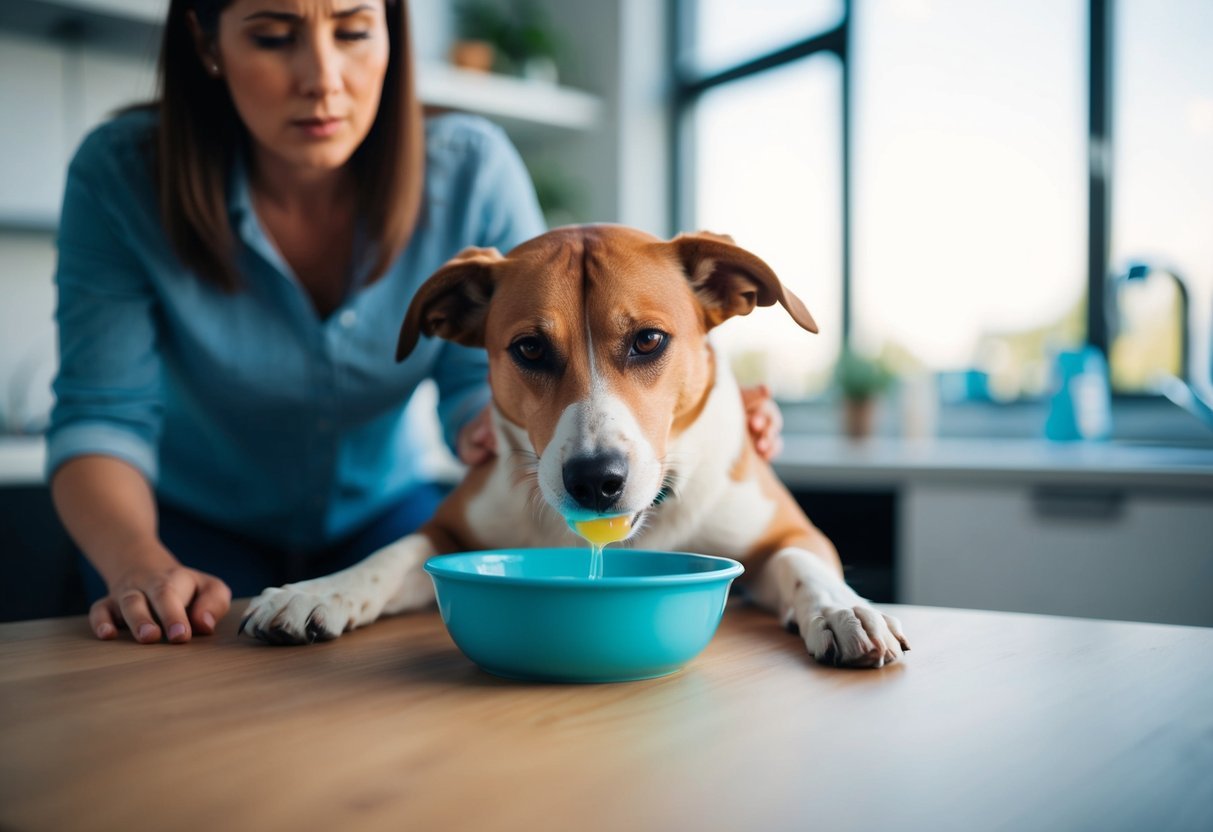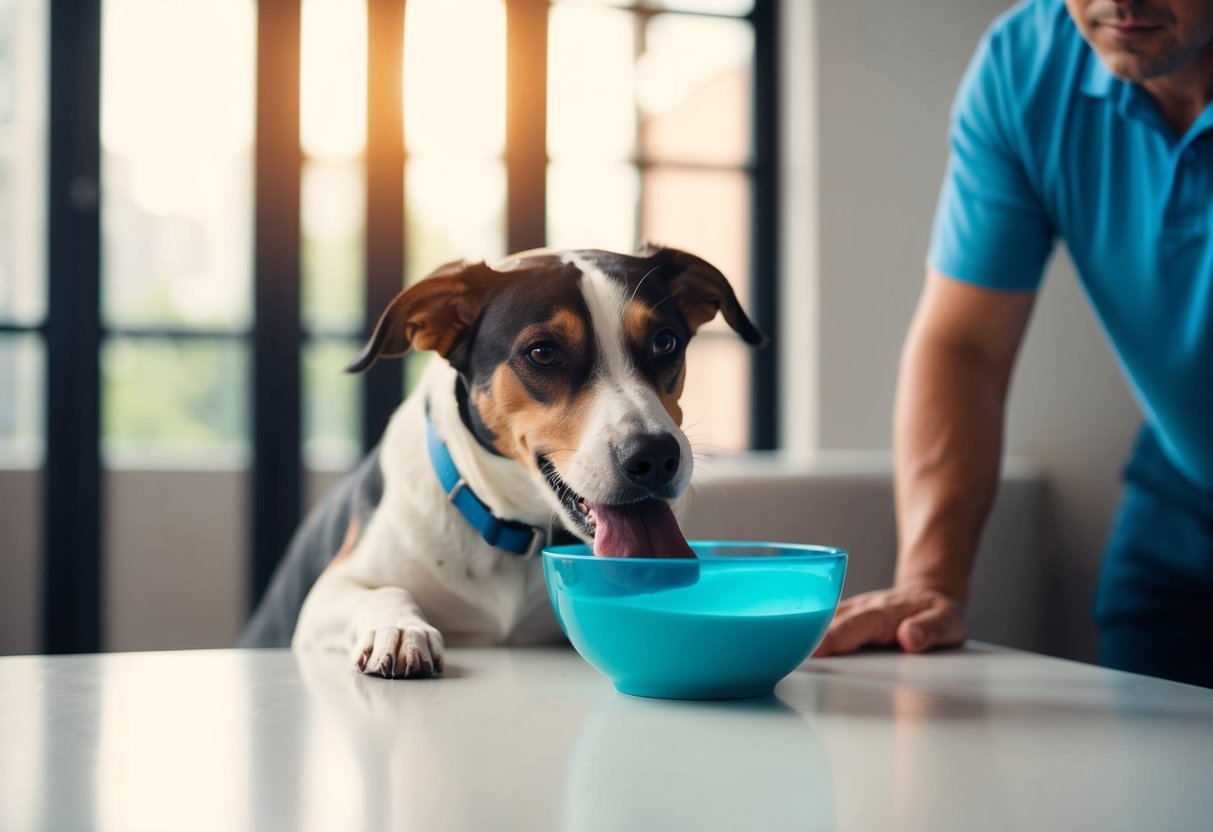When your dog isn’t feeling well, it can be tough to know how to help them.
Many pet owners are turning to Pedialyte, a common electrolyte solution, as a way to support their furry friends during these times. This article will explore five genius uses for Pedialyte that can truly change how you care for your sick dog.
Keeping your dog hydrated is key to their recovery, especially when they show signs of illness.
By incorporating Pedialyte in smart ways, you can provide essential electrolytes and fluids that might make a real difference in their health and comfort.
From helping with hydration to easing recovery, these uses of Pedialyte can be a game changer for you and your pup.
Rehydrate After Vomiting
If your dog has been vomiting, it’s important to help them rehydrate quickly.
Vomiting can lead to dehydration, which can make your pet feel even worse.
Using Pedialyte is a great choice for this.
It has the right balance of electrolytes and glucose to help your dog bounce back.
Start by offering small amounts.
You can use a syringe or a small bowl to give them Pedialyte.
Keep the portions tiny at first to avoid another upset stomach.
Monitor your dog’s reaction.
If they can keep it down, gradually increase the amount.
You can also mix it with their water to make it more appealing.
Always keep an eye on your dog’s symptoms.
If they continue to vomit or show signs of severe dehydration, reach out to your vet.
Your furry friend’s health is the top priority.
Soothe Upset Stomachs

If your dog has an upset stomach, Pedialyte can be a helpful option.
It’s gentle on their tummy and can help keep them hydrated.
When dogs have digestive troubles, they often lose fluids, so replacing those is important.
Mix a small amount of Pedialyte with water to encourage your dog to drink.
This can be especially useful if your dog is not eating or drinking much.
The electrolytes in Pedialyte can help them feel better faster.
You can also pour it over bland foods.
This can make their meal more appealing while providing hydration.
Always consult your vet before trying new solutions for your dog’s health issues.
They can advise you on the best way to use Pedialyte and ensure your dog stays safe.
For long-term issues, it’s key to find the underlying cause.
Pedialyte can be a temporary fix, but a trip to the vet may be necessary if problems persist.
Boost Electrolyte Intake

Pedialyte can be a great help when your dog is sick and needs to stay hydrated.
It is designed to replenish lost fluids and provide essential electrolytes.
Electrolytes like sodium and potassium play important roles in keeping your dog healthy.
They help regulate bodily functions, including nerve and muscle activity.
If your dog has been vomiting or has diarrhea, they might be losing these vital nutrients.
Pedialyte can help restore what’s been lost.
Just be sure to choose a version with low sugar.
Mix some Pedialyte with your dog’s food or offer it in a bowl for them to drink.
This can be especially helpful if your dog is not drinking enough water.
Always monitor your dog’s reaction to Pedialyte.
If they don’t seem to improve or if symptoms persist, it’s best to consult your vet.
They can give you advice tailored to your dog’s specific needs.
4) Encourage Hydration
Keeping your dog hydrated is super important, especially when they are not feeling well.
If your dog has an upset stomach or diarrhea, offering Pedialyte can help them stay hydrated.
Make sure to use the unflavored version and dilute it with water.
This makes it safe for your dog and easier for them to drink.
You can offer small amounts in a bowl or use a syringe if your pup is reluctant.
Dogs often prefer flavored water, but they may not be picky when they’re unwell.
Hydration helps them recover faster and can calm an upset tummy.
You might also notice that your dog feels more energetic after getting enough fluids.
Using Pedialyte as part of their hydration plan could be a game changer for your dog’s recovery.
Keeping them hydrated during tough times can make a big difference in their overall health.
5) Revitalize Dehydrated Skin

You might be surprised to find that Pedialyte can help with dehydrated skin.
Just like it replenishes fluids in dogs, it can also work wonders for your skin.
Mix a small amount of Pedialyte with your favorite moisturizer.
This can boost hydration and help restore your skin’s natural barrier.
Apply this mix gently to your face or any dry areas.
The electrolytes can help your skin hold onto moisture better.
For an extra refreshing boost, chill the mix in the fridge before using it.
This feels great, especially on tired or puffy skin.
Remember to check the ingredients in Pedialyte.
Avoid any flavorings or extras if you’re using it directly on your skin.
Keeping it simple is key for the best results.
Always do a patch test first to make sure your skin reacts well.
With these easy steps, you can help your skin feel soft and hydrated.
Understanding Pedialyte

Pedialyte is an oral rehydration solution designed to quickly restore lost fluids and electrolytes.
It can be a helpful tool when your dog is feeling under the weather, especially when hydration is crucial.
What Makes Pedialyte Unique
Pedialyte is packed with essential electrolytes like potassium and sodium.
It also has a specific balance of carbohydrates to help with absorption.
Most importantly, it comes in various flavors and formulations, like liquids and freezer pops.
This variety can make it easier for your dog to take.
The formula is designed to replace fluids and essential nutrients lost through vomiting or diarrhea, making it effective during illness.
Another plus is its lower sugar content compared to many sports drinks.
This keeps it safer for your pet while still aiding in hydration.
Is Pedialyte Safe for Dogs?
Yes, Pedialyte is generally safe for dogs, but moderation is key.
It’s important to choose unflavored or low-sugar options.
Sweeteners, like xylitol, can be harmful to pets.
Before giving Pedialyte to your dog, consult your vet, especially if your pet has underlying health issues.
They can guide you on the appropriate dosage based on your dog’s size and condition.
Monitor your dog’s reaction closely after introducing Pedialyte.
If you notice any adverse effects, stop use immediately.
Always prioritize hydration when your dog is sick, and Pedialyte may just be the hydration hero you need.
How Pedialyte Helps Sick Dogs

When your dog is feeling under the weather, keeping them hydrated and supported is crucial.
Pedialyte can be a helpful tool for your furry friend during these times, offering both hydration benefits and vital nutrients that can aid in their recovery.
Hydration Benefits
Dehydration can be a serious concern for sick dogs, especially if they are experiencing vomiting or diarrhea.
Pedialyte is designed to replace lost fluids and electrolytes efficiently.
-
Electrolytes: It contains important electrolytes like sodium and potassium. These help maintain fluid balance in your dog’s body.
-
Fast Absorption: Pedialyte is easy to digest. This means your dog can quickly absorb fluids, which is key when they are not drinking enough water.
Mixing Pedialyte into your dog’s water bowl can encourage them to hydrate.
Always follow your vet’s advice on how much to give based on your dog’s situation.
Nutrient Support During Illness
Sick dogs often have reduced appetites.
Pedialyte not only hydrates but also provides essential nutrients that can help support their health.
-
Sugar Level Control: The carbohydrates in Pedialyte can provide a quick energy boost, which is important for a dog that is sick and lethargic.
-
Vitamins and Minerals: Pedialyte includes some vitamins that can contribute to overall health. This can be particularly helpful if your dog isn’t eating their regular food.
Always consult your veterinarian before using Pedialyte to ensure it’s appropriate for your dog’s specific health needs.
Frequently Asked Questions

You might have some questions about using Pedialyte for your dog.
Here are specific answers to common concerns regarding its use, safety, and effectiveness for your pup.
Can Pedialyte help my pup with an upset tummy?
Yes, Pedialyte can help soothe an upset stomach.
It provides hydration and electrolytes, which may ease discomfort.
Always consult your vet before using it for this purpose.
How can I make homemade electrolytes for my dog?
To make homemade electrolytes, mix 1 cup of water, 1/2 teaspoon of salt, and 1 tablespoon of honey or sugar.
This mixture can help rehydrate your dog when Pedialyte isn’t available.
What’s the right Pedialyte dosage for my pooch based on weight?
A good rule of thumb is to give your dog about 1-2 teaspoons of Pedialyte per 10 pounds of body weight.
Adjust the amount based on your dog’s size and needs.
Is Pedialyte safe for treating my dog’s diarrhea?
Pedialyte can be safe for dogs with diarrhea as it replaces lost fluids and electrolytes.
Monitor your dog closely, and consult your veterinarian if diarrhea persists.
Can my dog have Pedialyte if they’re throwing up?
Yes, Pedialyte can be given to dogs that are throwing up, but it’s best to wait until they can hold down small amounts.
Start with tiny doses to avoid further vomiting.
Pedialyte vs. Gatorade: Which is better for hydrating dogs?
Pedialyte is typically better for dogs since it has fewer sugars and is made for rehydration.
Gatorade, while hydrating, may contain too much sugar and other ingredients that aren’t ideal for dogs.


